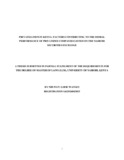| dc.description.abstract | The aim of this paper is to analyse the various factors that have contributed to the dismal performance of privatized companies quoted on the Nairobi Security Exchange (NSE) post their privatization and to appraise how the existing legal and institutional framework for the management of privatized SOEs has contributed to poor performance. The study focuses on nine companies which were privatized by way of public floatation and are currently quoted at the NSE as at January 2016. These companies are: 1) Safaricom Limited; 2) Mumias Sugar Company Limited; 3) Kenya Electricity Generating Company (KenGen); 4) Kenya Commercial Bank Limited (KCB); 5) Kenya Airways Limited; 6) National Bank of Kenya Limited; (NBK), 7) Uchumi Supermarkets Limited; 8) Kenya Reinsurance Limited; and 9) Housing Finance Company Limited. This paper is based on secondary data that was collected and analysed from both published and unpublished reports. Published data mainly came from the financial reports of these companies, investor returns, journals and newspaper articles. Unpublished data was obtained from research papers by other researchers on performance of privatized entities. The general conclusion is that, while the Government of Kenya undertook privatization with the objectives of: a) creating efficient and profitable operations of the State owned entities (SOEs); b) encouraging private sector’s participation in the economy through taking on more responsibility in the production of goods and services previously carried out by the Government; and c) reducing the overreliance by SOEs on the National Treasury and reduction of Government expenditure; these objectives have not been achieved fully. While there is a myriad of laws that regulate the operations of the SOEs, glaring gaps in the manner of appointments to the Boards of the SOEs has largely contributed to the inadequate governance structures in the management of the SOEs that hamper the Boards of SOEs from making sound investment decisions in the interest of the SOEs. Additionally, the Government remains a significant shareholder in most privatized SOEs. The Government therefore tends to exercise control over the SOEs through appointments to the Board of the SOEs. The excessive political intervention hinders the profitability of the SOEs due to the lack of autonomy by the Boards of the SOEs to make economically viable decisions in the interest of the SOEs. | en_US |



